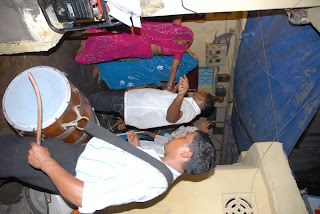New Delhi, India - Sitting in the atrium of The Imperial, enjoying high tea, I look up from my novel and catch the eye of a Westerner.
He and his friend start a conversation and soon join me at my table (though they drain a beer while I sip tea). Almost immediately they invite me to Kashmir with them. I smile and shake my head 'no'. I won't be joining the two strangers who just sat at my table and asked me to go with them to an area of India that has been plagued by terrorist activity for nearly two decades.
We continue chatting and they push Kashmir. I demure. But then one says, come with us to my cousin's shop in the bazaar (One of the men, Monzoor, is Kashmiri, though he has been living in Australia for almost 20 years). He'll drive you back to the hotel and we'll catch our train, they say.
I can't resist. Here's my chance to go somewhere in Delhi with a guide of sorts. Maybe this will shake me loose of culture shock's hold.
We head out. First an auto rickshaw ride to the metro (Delhi has a brand new subway system with one track. There's a metal detector and quite a groping by security as you enter).
As we exit the metro after one stop, I realize the craziness outside The Imperial is nothing. My senses are assaulted, leaving me without really taking anything in. I'm just jumping hurriedly from one sight to one sound to one smell...
The bazaar is narrow and crowded. There are cows chilling, eating trash, motorbikes whizzing by and people everywhere, selling, hawking, trading, buying, mingling and loitering. It smells.
We arrive after a short walk at Monzoor's cousin's shop, which is located, quite hidden, down a side alley.
Raqif has an easy smile and a welcoming demeanor. A French woman dressed in a bright pink sari with tattoos on her feet, is perched on a low stool. There are piles of shawls along the walls and a shelf with the ubiquitous but appealing Indian paper mache.

(Rafiq)
Rafiq dashes off to inquire about a plane ticket for me to Kashmir. I hesitate. I look at the shawls instead. No, I decide. I can't just fly off to Kashmir to meet up with two strangers.
But...why not? Spontaneous trips and adventures is what this journey is supposed to be all about. Staying with a family, eating home-cooked food and talking politics into the early morning - isn't that what I pictured in my head before I left?
Look around, Rafiq says, India is like a movie without a ticket. Enjoy it.

(impromptu dancing near Rafiq's shop to celebrate a new baby)
Going with the flow, letting your heart lead, that is what India is all about, the French woman says. Here, you aren't the driver, so relax and let yourself be taken, she says. Her love of India - she has been living in a small village four hours from Delhi, her husband and four kids in France - is calming.

(women watching the dancing)
I'm convinced. I buy the ticket.
Monzoor and his Hungarian friend, Gustav (also living in Australia), take off for their overnight train journey and then Jeep ride to Kashmir. And I sit on one of the low stools, drinking chai and talking politics with Rafiq.
Later, back at The Imperial, as I sit in a restaurant sipping Perrier and watching the musicians playing traditional Indian music, I realize I smell faintly of the bazaar and sweat - that sweet aroma of adventure.
And I feel like I am getting away with something, sitting in this impeccably decorated restaurant with its smartly uniformed staff and air of the British Raj.
I smile. Tomorrow I will leave the Imperial.












